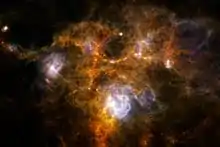NGC 7538
NGC 7538, near the more famous Bubble Nebula, is located in the constellation Cepheus. It is located about 9,100 light-years from Earth. It is home to the biggest yet discovered protostar which is about 300 times the size of the Solar System. It is located in the Cepheus' Arm of the Milky Way and is probably part of the Cassiopeia OB2 complex.[3] It is a region of active star formation including several luminous near-IR and far-IR sources.[3] Stars in NGC 7538 are mainly low-mass pre-main-sequence stars.[4]
| Diffuse nebula | |
|---|---|
 NGC 7538 Herschel 250 μm = Red, Herschel 160 μm = Green, Herschel 70 μm = Blue [1] | |
| Observation data: J2000.0 epoch | |
| Subtype | emission or reflection |
| Right ascension | 23h 13m 45.7s[2] |
| Declination | +61° 28′ 21″[2] |
| Distance | 9,100[3] ly (2,800 pc) |
| Apparent dimensions (V) | 9′.00 × 6′.0 |
| Constellation | Cepheus |
| Notable features | Contains largest known protostar |
| Designations | Bubble Nebula, Dreyer's Object, Sharpless 158 |
References
- Fallscheer; Reid; Di Francesco; Martin; Hill; et al. (2013). "Herschel Reveals Massive Cold Clumps in NGC 7538". Astrophysical Journal. 773 (2): 102. arXiv:1307.0022. Bibcode:2013ApJ...773..102F. doi:10.1088/0004-637x/773/2/102.
- "NGC 7538". SIMBAD. Centre de données astronomiques de Strasbourg. Retrieved 2006-10-20.
- Balog, Z.; Kenyon, S. J.; Lada, E. A.; Barsony, M.; et al. (2004). "A Near-Infrared (JHK) Survey of the Vicinity of the H II Region NGC 7538: Evidence for a Young Embedded Cluster". The Astronomical Journal. 128 (6): 2942–2953. arXiv:astro-ph/0409115. Bibcode:2004AJ....128.2942B. doi:10.1086/425548.
- Symposium, International Astronomical Union; Union, International Astronomical (2007-05-28). Triggered Star Formation in a Turbulent Interstellar Medium (IAU S237). Cambridge University Press. p. 458. ISBN 978-0-521-86346-9.
External links
 Media related to NGC 7538 at Wikimedia Commons
Media related to NGC 7538 at Wikimedia Commons
.png.webp)
Map showing location of NGC 7538 (Roberto Mura)
This article is issued from Wikipedia. The text is licensed under Creative Commons - Attribution - Sharealike. Additional terms may apply for the media files.